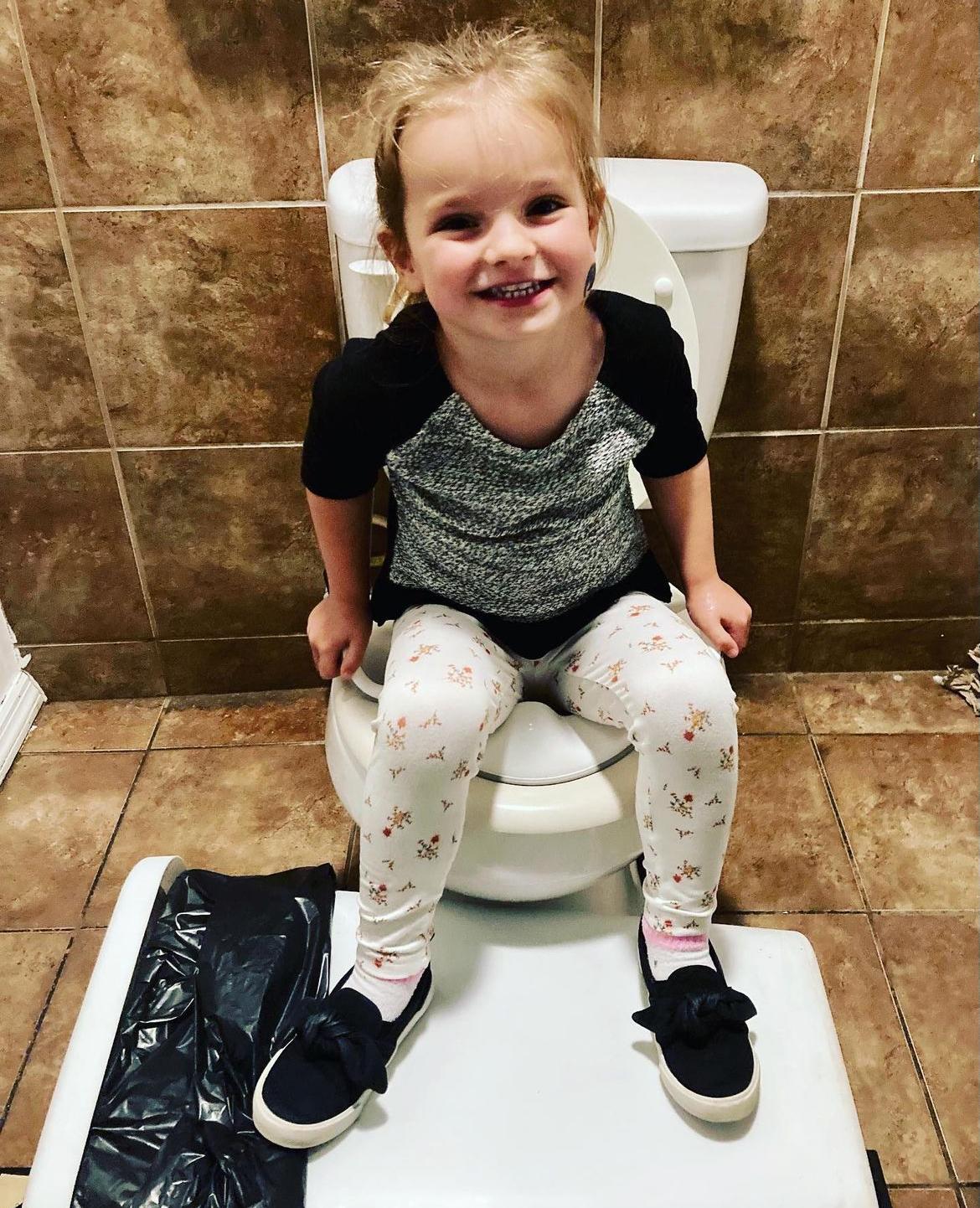Disclosure :: This post is sponsored by Pivotal PT + Wellness.
Pediatric Pelvic Floor Physical Therapy :: Yes, Pelvic PT Is For Kiddos Too
 There’s Pelvic Floor Physical Therapy for kids?!
There’s Pelvic Floor Physical Therapy for kids?!
We actually get this question a lot! Many, many people (potential patients, current patients, and other medical professionals) are of the belief that pelvic floor physical therapy is only for women who have had babies or are going through menopause. While those patient populations are certainly good candidates for pelvic PT, they aren’t the only ones who can benefit from seeing a Pelvic Floor Physical Therapist. Believe it or not, pelvic PT is for EVERYONE! That’s right. Women, men, AND children can all potentially be ideal candidates for pelvic PT.
I know what you may be thinking. “Why would a child need pelvic PT?”, and that’s an excellent question! Pediatric Pelvic Floor Physical Therapy can be a wonderful treatment option for kiddos who are withholding (urine or feces), experiencing leakage (urine or feces), chronically constipated, persistently wetting the bed, or struggling with potty training. Some things that appear to be negative behaviors or poor choices, may actually be adaptations due to their pelvic floor dysfunctions. You may hear a child say, “I didn’t know I needed to go [to the bathroom]” or “I couldn’t feel it [coming out].” Some children may even be specifically resistant to using the toilet, talking about pee and poop, or cleaning themselves. In many instances this may be due to decreased awareness, or anxiety about the unknown. You see, bowel and bladder control is managed by the pelvic floor muscles in children, just like in adults. The main difference is that kids don’t have as much awareness of these muscles just yet.
Kiddos Can Experience Pelvic Pain Too
Another reason a child may benefit from seeing a pelvic floor physical therapist is for pain. Pelvic floor PTs have an extensive understanding of anatomy and physiology, especially related to the pelvis, back, and abdomen. So pain in any of these areas may indicate a need for a PT evaluation. And if traditional, orthopedic PT is not beneficial, then the cause might just be the pelvic floor. It is also not uncommon for pelvic floor and orthopedic symptoms and conditions to overlap. In some instances, the pain seems to bounce around, appearing in one area one moment and then in a different area the next. It may even be hard to reproduce during an orthopedic evaluation. This presentation can be especially challenging to diagnose, so a pelvic floor specialist may be a great addition to the healthcare team!
Finally, coming to a pelvic floor PT before and after abdominal or pelvic surgery is another reason to see our specialty. Before surgery, care is taken to ensure that the tissues are prepared and that the muscles are strong and well coordinated to optimize post-op healing. After surgery, PT helps manage scar tissue and pain, provides exercises to regain strength, functional modifications to protect the surgical area, and strategies to return to normal function.
But How?
The next thing you may be thinking is “How do you treat kids with these issues?” and that’s a great question! Firstly, there is absolutely no internal exam or treatment on a minor. Every part of the evaluation is done externally, mostly focused to the abdomen and core, and verbal consent is obtained from the parent and child prior to each phase of the visit. Additionally, the parent is present for the duration of every appointment when evaluating and treating minors. (Side note: There are two exceptions to this. First, an internal exam may be performed on a minor who is sexually active and having pain with intercourse if an internal exam has already been performed by a physician and both the parent and the child agree to any internal examination by the pelvic floor physical therapist. Second, it doesn’t happen often, but if the external perineal tissues need to be examined, this is only done with parent and child consent; no exceptions.) Informed consent, which includes the right to refuse, is one of the most important aspects of any and all evaluations performed at  Pivotal PT and Wellness. This is especially true for our pediatric patients.
Pivotal PT and Wellness. This is especially true for our pediatric patients.
As mentioned above, most of our evaluation is focused around the abdomen and core. This is because there is a connection between the transversus abdominis (TA or deep abdominal) muscle of the abdomen and the pelvic floor muscles, and these muscles should coordinate together as they contract and relax. Pelvic floor PTs use this abdominal muscle specifically to help evaluate the muscles of the pelvic floor. The entire core; which includes the pelvic floor, TA, multifidus (back), and diaphragm; is used to retrain the pelvic floor muscles based on a child’s individual presentation. And don’t worry, we make it fun!
Therapy Is Always Better When It’s Fun!
Jenny, our resident pediatric pelvic PT, is excellent at what she does! And her goal is always to make it fun without adding more stress for the kiddos!
She uses things like fringed party horns and bubbles to teach them proper breathing and pressure management, and silly games to help them understand how the muscles of their pelvic floor work! Jenny works with kids who have conditions like cerebral palsy to help manage their high tone and spasms that often lead to pelvic, back, and abdominal pain, as well as children who have low tone conditions such as Down syndrome leading to poor core control. She also does a lot of patient and parent education to help improve daily function. It really is a wonderful treatment option for kids and their parents.
So if your child is behaving oddly related to bowel or bladder function, get curious. Ask them detailed questions without judgment or assumptions. Their answers may surprise you! It’s also very common for an answer to be “I don’t know”, especially for younger children. The more absurd a behavior appears, in my experience, the more likely there is a pelvic floor dysfunction that the child is trying to manage on his/her own without explicit awareness. If there is any pain or surgery, this should be addressed more quickly. Pain in children can easily turn into chronic pain or complex regional pain syndrome (CRPS), which we always try to avoid. Evaluation by the child’s healthcare team, including a pelvic floor physical therapist, is usually the best approach when the pain doesn’t appear to be improving.
If you have personalized questions, or a kiddo who you think may benefit from pelvic floor physical therapy give us a call! Additionally, if you would like to schedule an in-person or virtual consultation, please call our clinic ((504) 358-0560) or visit our website! Pivotal PT + Wellness would be honored to be part of your healthcare journey!
Looking to learn more about Pivotal PT + Wellness? Check out these posts ::
- Why Investing In Pelvic Floor Physical Therapy Is A Must For Every Woman
-
Speculums, Stirrups, and Sex – Oh My! :: Why Pelvic Floor Physical Therapy Doesn’t Have To Be Scary
About the author
Dr. Jenny Porter attended Missouri State University to receive bachelor degrees in Biology and Spanish and went on to receive her Doctorate of Physical Therapy. Since then, she has specialized in Pelvic Floor Physical Therapy, completing the APTA CAPP-PELVIC and CAPP-OB trainings, as well as further specializations in Pediatrics, Athletes, and Male Pelvic  Health. She enjoys helping men, women, and children improve urinary, fecal, sexual, and pain dysfunctions throughout the lifespan. Jenny’s personal experience as a mom helps her make Pediatric Pelvic Health fun and effective for her young clients. Jenny also specializes in Antepartum, Intrapartum, and Postpartum Care, allowing her to help women and their champions manage the physical changes that come during and after pregnancy as well as prepare for a healthy delivery. Her own experiences with pregnancy and childbirth allows her to provide compassionate and supportive care to each patient. Jenny is certified in orthopedic and pelvic floor functional dry needling, giving her unique skill sets to offer her patients. She has been the a guest on the FABM BASE podcast several times and enjoys educating the community on the benefits of pelvic floor physical therapy and body autonomy. Outside of work, she enjoys spending time with her husband, and running around with their 4 kiddos and two rottweilers.
Health. She enjoys helping men, women, and children improve urinary, fecal, sexual, and pain dysfunctions throughout the lifespan. Jenny’s personal experience as a mom helps her make Pediatric Pelvic Health fun and effective for her young clients. Jenny also specializes in Antepartum, Intrapartum, and Postpartum Care, allowing her to help women and their champions manage the physical changes that come during and after pregnancy as well as prepare for a healthy delivery. Her own experiences with pregnancy and childbirth allows her to provide compassionate and supportive care to each patient. Jenny is certified in orthopedic and pelvic floor functional dry needling, giving her unique skill sets to offer her patients. She has been the a guest on the FABM BASE podcast several times and enjoys educating the community on the benefits of pelvic floor physical therapy and body autonomy. Outside of work, she enjoys spending time with her husband, and running around with their 4 kiddos and two rottweilers.
















